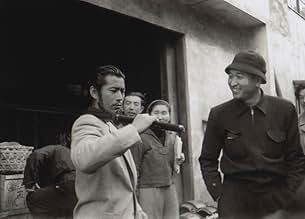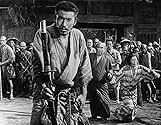IMDb RATING
7.2/10
1.5K
YOUR RATING
A feature-length documentary about the life and films of legendary actor Toshiro Mifune, weaving together film clips, archival stills, and interviews with such luminaries as Steven Spielberg... Read allA feature-length documentary about the life and films of legendary actor Toshiro Mifune, weaving together film clips, archival stills, and interviews with such luminaries as Steven Spielberg and Martin Scorsese. Narrated by Keanu Reeves.A feature-length documentary about the life and films of legendary actor Toshiro Mifune, weaving together film clips, archival stills, and interviews with such luminaries as Steven Spielberg and Martin Scorsese. Narrated by Keanu Reeves.
- Director
- Writers
- Stars
- Awards
- 3 nominations total
Tadao Satô
- Self
- (as Tadao Sato)
- Director
- Writers
- All cast & crew
- Production, box office & more at IMDbPro
Featured reviews
It is a good documentary on an actor that made a big impact in Japan and was important to the export and prominence of Japanese film worldwide, but is slowly being forgotten. With that said, I can only feel that the film had limited budget, research capability and focused only on a small sliver of who and what Toshiro Mifune was. The focus is on Toho and his work in chanbara films with Kurosawa. That is indeed his most important and notable period, but there is not much depth added even in those segments. As interesting as the subject matter is I would still say it is a good documentary where none other exist, but more relevant to those who know little about the actor.
We owe a debt of gratitude to Steve Okazaki, an American film maker of Japanese ancestry, for recalling the magnetic Japanese film star Toshiro Mifune, who in collaboration principally but not exclusively with Akira Kurozawa, during 16 years of a frenetic, fecund period of Japanese cinema that left his indelible mark on world cinema. Okazaki cleverly kept his camera on Mifune as samurai, the last samurai, which is slightly misleading. The decline of rerun houses and Japanese film retrospectives may have dimmed the memory of an extraordinary actor. Mifune was an outsider, a fact few know. He was born in China, in Dalian. At 20, he first came to Japan for military service, not welcome but treated as second class. He kept his counsel, cultivated a quiet patience and persevered. In fact, an actor of the Golden Age of Japanese cinema, thought of only one word that defined Mifune: perseverance, a steadfastness ignoring difficulties in achieving success. Other actors spoke of his tenacity, his gambatte spirit, but also of his generosity and kindness. At first he had a limited vision of a career: a camera man, but Kurozawa saw something in him as an actor. And the rest, as they say is history. But Mifune's eyes, they had a hypnotic effect. They had a beam, a spark of something special, something god-like, if you will, that on screen the spectator knew he was in the presence of a talent that enchanted him. An actor whom his directors left alone to develop his character, and they were not wrong, for Mifune gave his all to his samurai and dramatic roles that so quickly resonated in his fans inner being. You only have to think of his peasant who wanted to become a warrior in 'Seven Samurai' or the gruff, quick thinking general in 'Hidden Fortress' or his wily 'Yojimbo' or his subtle portrayal in 'Red Beard',where without a sword he prevails. And then there's his portrayal of Kurozawa' adaptation of 'Macbeth', 'Throne of Blood' where real arrows were used to kill the usurper he portrays, and his costar Isusu Yamada as a spellbinding Noh like Lady Macbeth. Okazaki mentions but slights the broader acting skills of Mifune, with the great Takashi Imamura. Look again at 'High and Low', 'The Bad Sleep Well', 'Lower Depths' and the less great Kurozawa's version of Dostoevski's 'The Idiot' with the legendary Sestsko Hara. As the quintessential samurai, Mifune gained an international reputation and following. (What greater homage could be paid by Alain Delon in Melville's 'le samourai'). In later life, as head of a production company,he made and played endless endlessly the samurai. Never one to shirk responsibility, he brought his samurai into television as cinema waned. But age and the burden of keeping his emotions pent up, had its toll in heavy drinking and fast cars and scandal which broke up his marriage. And then alzheimer claimed him and he died at 77 in 1997. Now gone these almost 20 years, Okazaki brought him back to us and it is hoped to a younger generation of film enthusiasts who could do no better than to see Mifune's films.
A Cliff Notes type look at the volcanic thespian that was Toshiro Mifune whose collaboration w/Akira Kurasawa rivals other actor/director relationships like Bogart/Huston & DeNiro/Scorsese. We get the usual boilerplate of timeline from his early days as an actor to the bullet points of film roles which defined his career. I wish the filmmaker delved deeper but as said in the doc, he was a very private man so what we have is a good entryway to this marvelous talent.
(*Toshiro Mifune quote*) - "I'm not always great in pictures, but, I'm always true to the Japanese spirit."
Toshiro Mifune (1920-1997) was a notable Japanese actor who appeared in more than 150 feature films. Throughout his lifetime he achieved more worldwide fame than any other Japanese actor of the 20th century.
Through stills, archival footage, and interviews - This "Last Samurai" documentary takes a close-up look at the life and career of Toshiro Mifune.
Toshiro Mifune (1920-1997) was a notable Japanese actor who appeared in more than 150 feature films. Throughout his lifetime he achieved more worldwide fame than any other Japanese actor of the 20th century.
Through stills, archival footage, and interviews - This "Last Samurai" documentary takes a close-up look at the life and career of Toshiro Mifune.
Steven Okazaki directed this excellent documentary about the famous Japanese actor, Toshirô Mifune and it's narrated by Keanu Reeves. As a lover of Japanese films, seeing this picture was an absolute must and I must point out that many of my favorite Japanese movies starred this incredibly talented man. However, in many ways it's a film less for folks like me, as I've seen almost all the films they discussed in the documentary. Instead, it would be a perfect introduction to his films and would provide you with many great recommendations of pictures you simply have to watch! And, as I already love and respect Mifune, the film didn't do much to change this!
I should point out that if you want a more biographical look at the man, this may not completely satisfy you. You do learn about his life but I never exactly felt like I truly knew the man as I watched. Instead, it's much more of a filmography and as such highlighted his very best films and discussed them and their impact as well as how Mifune was able to make the most in his performances. In fact, when you do learn personal information, it's mostly negative, such as his very heavy drinking and marital infidelity. I would have loved to hear more from his son, Shiro, in order to learn more about who Toshirô really was off camera. Shiro is featured .but I wanted to hear much more. In addition to interviews with the son, you hear from many actors who worked with him as well as from American directors like Spielberg and Scorsese! Wow you wonder how Okazaki was able to get all this great contributors!
Overall, this is a very well crafted film with lots of beautiful film clips, excellent graphics and editing and is really a must-see for anyone interested in international cinema. It's also a must-see for anyone who loves the films of Akira Kurosawa, as many of their best films were collaborations and are discussed in detail in this lovely documentary.
I should point out that if you want a more biographical look at the man, this may not completely satisfy you. You do learn about his life but I never exactly felt like I truly knew the man as I watched. Instead, it's much more of a filmography and as such highlighted his very best films and discussed them and their impact as well as how Mifune was able to make the most in his performances. In fact, when you do learn personal information, it's mostly negative, such as his very heavy drinking and marital infidelity. I would have loved to hear more from his son, Shiro, in order to learn more about who Toshirô really was off camera. Shiro is featured .but I wanted to hear much more. In addition to interviews with the son, you hear from many actors who worked with him as well as from American directors like Spielberg and Scorsese! Wow you wonder how Okazaki was able to get all this great contributors!
Overall, this is a very well crafted film with lots of beautiful film clips, excellent graphics and editing and is really a must-see for anyone interested in international cinema. It's also a must-see for anyone who loves the films of Akira Kurosawa, as many of their best films were collaborations and are discussed in detail in this lovely documentary.
Did you know
- TriviaHisao Kurosawa helped make this documentary. He is the son of legendary director Akira Kurosawa, who often collaborated with Toshirô Mifune.
- Quotes
Shirô Mifune: It was his compassion that made him rebellious.
- ConnectionsReferenced in It's a Summer Film! (2020)
- SoundtracksInfra 4
Composed by Max Richter
Performed by Louisa Fuller, Natalia Bonner, Nick Barr, Ian Burdge, Chris Worsey
Courtesy of Deutsche Grammophon GmbH, Hamburg
Under license from Universal Music Enterprises
- How long is Mifune: The Last Samurai?Powered by Alexa
Details
- Release date
- Countries of origin
- Official sites
- Languages
- Also known as
- 三船敏郎:最後的武士
- Filming locations
- Production companies
- See more company credits at IMDbPro
Box office
- Gross US & Canada
- $62,279
- Opening weekend US & Canada
- $4,296
- Nov 27, 2016
- Gross worldwide
- $62,279
- Runtime
- 1h 20m(80 min)
- Color
- Aspect ratio
- 1.66 : 1
- 2.35 : 1
Contribute to this page
Suggest an edit or add missing content

































